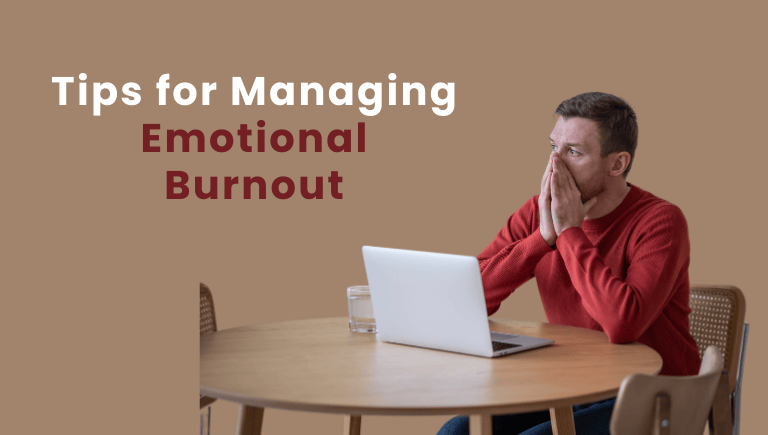Emotional burnout is a serious condition that can impact your work and personal life. It can cause a range of symptoms, including physical pain, loss of appetite, apathy, and cynicism.
Fortunately, you can manage emotional burnout by recognizing the signs and taking steps to address them. A counselor can help you identify the causes of burnout and explore coping methods that might work for you.
Take Care of Yourself
Emotional burnout can cause problems with your mood, relationships, and sleep. It can also affect your work performance, physical health, and overall well-being. Fortunately, there are many things you can do to prevent emotional burnout.

Some warning signs of emotional burnout include feeling tired all the time, irritable or angry, and having trouble concentrating. You may also feel emotionally detached from friends and family and lose interest in activities you normally enjoy. Eventually, you might start to resent your job or home life and begin to think about quitting.
Some tips for managing emotional burnout include getting plenty of sleep, exercising regularly, and eating a healthy diet. You should also try to connect with loved ones and practice self-compassion. If you’re struggling with emotional burnout, seek help from a therapist who can teach you stress management techniques and provide support. You can also find a support group or ask for help from co-workers.
Practice Self-Care Techniques
People who suffer from emotional exhaustion are drained by excessive stress, whether it’s in the workplace or at home. They feel as though they are empty and powerless, beyond caring about anything. These feelings can also cause physical problems, such as stomach pains and headaches.
Practicing self-care techniques can help combat emotional exhaustion and burnout. Get plenty of rest, stay hydrated, and eat healthy. Make time to spend with friends and family. It’s also important to take a daily break from technology. Getting away from the computer and phone can relieve stress and allow you to focus on something other than work.
If you find yourself constantly feeling burned out, it may be time to seek professional help. A counselor can teach you coping skills and suggest strategies to improve your life. If the problem is work-related, you can consider a change in career or taking a sabbatical.
Find a Support Group
If you’re a person who tends to burn out, or you have a high risk of burning out, it’s worth it to take the time to find a support group. These groups are often virtual, but they bring together people who have a common experience. They may have gone through a significant change in life, lost a loved one, suffered from a chronic illness or mental health condition, or they might share a marginalized identity that makes them vulnerable to stressors.
These people know exactly how you feel because they have been there, and done that. You can ask your doctor or mental health professional about local groups, or you can try looking up mutual support groups online. It’s important to remember that the people in a support group are sharing their experiences with you, so it can be awkward at first. It’s also important to respect the privacy of other members.
Ask for Help
Whether you’re dealing with emotional burnout or any other life challenge, it’s important to ask for help when needed. Duke recommends counseling and psychotherapy, which can help people understand how their thoughts and beliefs contribute to stress and how to replace unhelpful patterns with more balanced thought processes.
If outside factors contribute to your emotional burnout, it’s important to reach out for help. For example, if you feel overwhelmed by your workload, try talking to your manager about making changes to the job or finding another more fulfilling role.
Also, try to incorporate regular relaxation techniques into your life. You can find group activities to practice them with others or use an app or online video to guide you. You can also talk to a friend, family member, or mental health professional for support. If you’re struggling with suicidal feelings, call or text the Crisis Hotline for immediate help.
Get a Better Job
Having a fulfilling job is a great feeling. But if you find yourself constantly exhausted by your work and feel like it’s not making a difference, you may be experiencing burnout. This can lead to emotional exhaustion and mental health problems if not treated.
Emotional burnout can affect anyone, but it is particularly common among people with demanding jobs, caregivers, and those who are dealing with life challenges such as a loss or chronic illness. Some experts suggest genetics play a role in a person’s likelihood of suffering from burnout as well.
Gold says a big part of combating emotional burnout is finding coping mechanisms that work both immediately and long-term, including exercise, healthy eating, and social activities. She also recommends counseling or a support group.
Take a Break
Emotional burnout can make you feel powerless. You may blame outside factors, like a lack of financial stability or the stress of caring for an aging parent, and find it hard to imagine how you can ever recover.
Identifying your symptoms can help you realize that it’s time to take a break. You can also ask your therapist to help you find ways to deal with your feelings of emotional exhaustion and learn healthier coping skills.
Effective breaks usually involve intrinsic motivation, such as doing something you enjoy. If you have trouble sticking to your scheduled breaks, try setting an alarm on your phone to remind you, or making a list of activities that meet the criteria for a good break (like studying biology instead of reading social media). You can even find a buddy who will help keep you accountable for taking a break!
